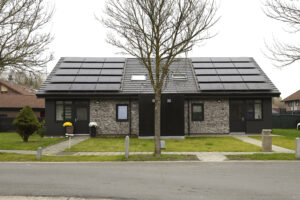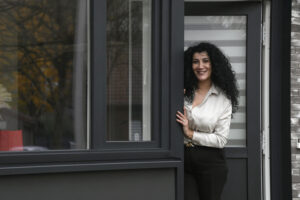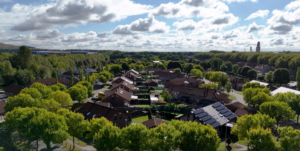A major milestone has been reached in Nieuw Texas in Genk (BE): the renovation of 27 social housing units under the European oPEN Lab project has been completed. This transformation demonstrates how technological innovation, energy performance and comfort can go hand in hand.
What began as a pilot initiative now marks the start of a sustainable transformation that combines innovation, community participation, and future-oriented living. With this, Nieuw Texas is ready to enter the next phase of the project: collecting and analysing real-life data.
Smart renovations at record speed
Thanks to industrialised techniques such as prefabricated façade panels and a modular energy box – pre-integrated with components like a heat pump, ventilation system, and buffer tank – the houses were renovated in an average of just eight weeks. Each unit received a tailored combination of solutions, including green roofs, solar panels, smart ventilation, and additional insulation.
“As a social housing company, we face the challenge of delivering sustainable, high-quality homes in an increasingly complex context,” say Philippe Plaghki and Raymond Visser, project managers at Wonen in Limburg. “With oPEN Lab, we are proving that collaboration, innovation, and resident involvement can lead to concrete results today. Nieuw Texas shows that renovations can be both technically robust and socially inclusive.”

1. Energetically renovated home in New Texas, Genk
Creating support with residents
From the outset, residents played an active role through information sessions and individual guidance. Their input was essential to ensure the renovations aligned with their everyday needs.
One key goal was to carry out the work without requiring residents to relocate, to avoid adding pressure to the already strained social housing waiting list. However, for some residents, the impact on privacy and tranquility proved too disruptive. Flexibility was therefore built into the process, allowing residents to opt for temporary accommodation, with the necessary support provided.
“Residents are not just end users; they are partners in making their living environment more sustainable,” say Lore Parade and Anneleen Baptist of Wonen in Limburg. “Through co-creation and intensive participation, we aimed for a socially supported renovation process. Our experience showed that proactive identification of obstacles, honest communication, and close collaboration are crucial to building this support together with residents.”

2. Resident Aynur Tosun at her home in New Texas, Genk
Next phase: research in the renovated houses
With the renovation phase completed, the “living lab” begins: over 200 parameters – such as temperature, air quality, and energy consumption – are being measured in each home via a smart IT platform.
Initial data shows that energy demand for heating and hot water has been roughly halved, and the indoor climate has significantly improved. The coming months and seasons will reveal which technologies and combinations are most effective, and how they contribute to comfort and affordability.
“The renovation was intense, but I can already feel the difference,” says resident Aynur, who lives in Nieuw Texas with her family. “There’s no more draft, the rooms are much warmer in winter, and I feel more comfortable in my home.”

3. Aerial view of New Texas neighborhood, Genk
The road ahead
The renovations in Nieuw Texas represent a key step toward a sustainable living environment. The project offers valuable insights into how renovations can enhance energy performance, comfort, and affordability.
At the same time, the project highlights that even with advanced technical improvements, affordability cannot be taken for granted. Current electricity prices challenge the feasibility of sustainable solutions and hinder their broader implementation. This underlines the need for structural support and adapted policy frameworks to enable such projects at scale. At the same time, energy market trends point toward a shift in favor of electricity and away from fossil fuels, offering residents greater protection against future price fluctuations.
The approach in Nieuw Texas demonstrates that when applied thoughtfully, technical innovation, resident involvement, and energy performance can reinforce one another – with the support of residents, partners, and policymakers.
“We’re at the beginning of a new chapter where we can gather real insights into energy performance, comfort, and affordability,” says Maarten De Groote, Programme Manager at EnergyVille/VITO. “oPEN Lab is becoming an European testing ground for the cities of tomorrow.”
—————————————————————————————————————————————————
As part of the oPEN Lab project – a large-scale European research initiative supported by Horizon 2020 and coordinated by VITO – the Nieuw Texas neighbourhood in Genk was selected as a pilot site for the transition toward a positive energy district. In total, 27 social housing units managed by Wonen in Limburg were renovated to improve their energy performance. The oPEN Lab project received funding from the European Union’s Horizon 2020 research and innovation programme under grant agreement No. 101037080.
